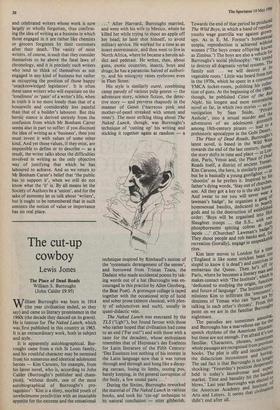The cut-up cowboy
Lewis Jones
The Place of Dead Roads William S. Burroughs (John Calder £9.95)
William Burroughs was born in 1914 (the year civilisation ended, so they say) and came to literary prominence in the 1960s (the decade they danced on its grave). He is famous for The Naked Lunch, which was first published in this country in 1963. It is an extraordinary work, both in subject and style.
It is apparently autobiographical. Bur- roughs came from a rich St Louis family, and his youthful character may be surmised from his numerous and identical adolescent heroes — Kim Carsons, for example, from his latest novel, who is, according to John Calder (Burroughs's publisher and cham- pion), 'without doubt, one of the most autobiographical of Burroughs's pro- tagonists': 'Kim is a slimy, morbid youth of unwholesome proclivities with an insatiable appetite for the extreme and the sensational ' After Harvard, Burroughs married, and went with his wife to Mexico, where he killed her while trying to shoot an apple off her head; he later shot himself, to avoid military service. He worked for a time as an insect exterminator, and then went to live in North Africa, where he became a heroin ad- dict and pederast. He writes, then, about guns, exotic countries, insects, boys and drugs; he has a paranoiac hatred of authori- ty, and his misogyny raises eyebrows even in Fleet Street.
His style is similarly outré, combining camp parody of various pulp genres — the adventure story, science fiction, the detec- tive story — and perverse rhapsody in the manner of Genet (`nacreous pink and mother-of-pearl streaked with semen and roses'). The most striking thing about The Naked Lunch, though, was Burroughs's technique of 'cutting up' his writing and sticking it together again at random — a
technique inspired by Rimbaud's notion of the 'systematic derangement of the senses', and borrowed from Tristan Tzara, the Dadaist who made accidental poems by tak- ing words out of a hat (Burroughs was en- couraged in this practice by Allen Ginsberg, the Beat Poet). A grotesque collage is taped together with the occasional strip of lucid and sober prose (almost classical, with plen- ty of subjunctives and such), usually in quasi-didactic vein.
The Naked Lunch was execrated by the TLS (`LIgh!'), but found favour with those who rather hoped that civilisation had come to an end ('Far out!') and with those with a taste for the decadent, whose enthusiasm resembles that of Huysman's des Esseintes for Latin literature of the Fifth Century: `Des Esseintes lost nothing of his interest in the Latin language now that it was rotten through and through and hung like a decay- ing carcass, losing its limbs, oozing pus, barely keeping, in the general corruption of the body, a few sound parts ... '
During the Sixties, Burroughs reworked the material of The Naked Lunch in various books, and took his 'cut-up' technique to its natural conclusion — utter gibberish. The Spectator 19 May 1980 Towards the end of that period he produced The Wild Boys, in which a band of reptilian youths wage guerrilla war against grown' ups. As in E. M. Forster's homosexual utopia, reproduction is achieved without women (`The boys create offspring lattIvin as Zimbus.') The boys are also a vehicle for Burroughs's social philosophy: 'We intend to destroy all dogmatic verbal systems. The family unit . . we will destroy at Its vegetable roots.' Little was heard from him in the 1970s, which he spent in a converted YMCA locker-room, polishing his collec- tion of guns. At the beginning of the l980si, though, he published Cities of the Rea Night, his longest and most entertaining novel so far, in which two stories — an in- vestigation by Sam Snide, ,private Asshole', into a sexual murder and t.h bt adventures of an adolescent gunsini-. among 18th-century pirates — lead to prehistoric apocalypse in the Gobi Desert; The Place of Dead Roads, Burroughs st latest novel, is based in the Wild,W„eash- tbwards the end of the last century, tll°,, the story shifts in time and place — t°,.‘"„-d don, Paris, Venus and, the Place of ve- Roads itself, a district of ancient Yell°. Kim Carsons, the hero, is similarly protean; but he basically a young gunfighter shoonst' as he prefers it. Inspired by RI" , father's dying words, 'Stay out of churches, son. All they got a key to is the shit house; And swear to me you will never wear of lawman's badge', he organises a Prig ti,, homosexual bandits, dedicated to bed . gods and to the destruction of establishe.. order: 'Boys will be organised into Sill` Slaughter troops ... the S.S., with twii° phosphorescent spitting cobras at theo lapels ...' (Churches? Lawman's badg!*; They shoot people and rob banks and, I,fle recreation (literally), engage in unspeakau rites.Kim later moves to London for a time (`England is like some stricken beast to stupid to know it is dead') and contrives o' embarrass the Queen. Then he's off td Paris, where he becomes a literary machs makes contact with 'The Institute , 'dedicated to studying the origin, function and future of language'. The Institute co , missions Kim to infiltrate the denizens of Yeman who can 'have sex talking in each other's throats'. Front t11`, nightmare.
point on we are in the familiar Burrour'
The parodies are sometimes arnusin.g_ and Burroughs has a marvellous ear for the speech rhythms of the American illn but these are not enough. I'm afraid it's. W1" esmourier.s familiar. Characters, phrases, sometunuess whole passages are recognised from pre books The plot is silly and inconclusive, the didacticism inconsistent and hori°15... The sad fact is that Burroughs is no shocking: 'Yesterday's position desp Super held is today's laundromat and slest market. Time and banality hit the elected to blows.' Last year Burroughs was e-: of tee ,r.7 dtheAmenedricaafnter l.Aaclademy and Insntn () re -
Arts and Letters. It seems that civilisa didn't ti














































 Previous page
Previous page